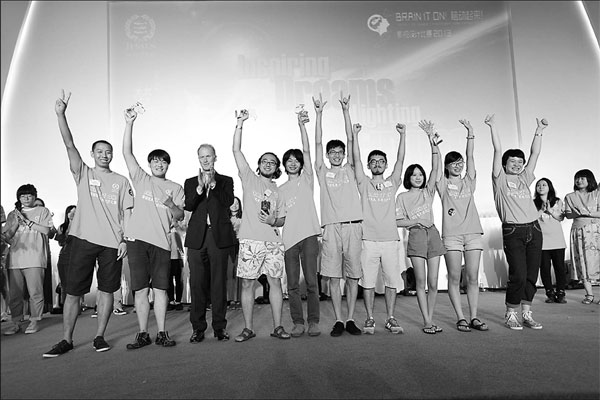Film competition fosters talent
Updated: 2013-10-05 07:38
By Huang Ying (China Daily)
|
|||||||||||
Initative targeted at students aims to address shortage of high-quality professionals in the movie industry across the country. Huang Ying reports.
For the first time, Zheng Xiaoyun is a bit closer to achieving her dream of becoming a film director, thanks to a student video competition.
The intense five-month BRAiN iT ON! competition, which was launched by the Jebsen Industrial in March, offered contestants a chance to shoot their own films with the most advanced digital camera in the market - the Arri Alexa camera.
The initiative is one of the ways to tackle a shortage of movie-making talent in China, industry observers said.
|
The team who won Jebsen Industrial's maiden Student Video Contest at the awards ceremony on Aug 23 in Beijing. Provided to China Daily |
|
A screen shot taken from the competition's top film: Art Jebsen, which was created by the China Academy of Art. Provided to China Daily |
All the contestants received training to learn how to use the equipment and technology support from Jebsen Industrial, a major filmmaking and shooting equipment supplier in China.
"The most important lesson I learned from this contest is that technology matters in the filmmaking process, but it still is not as important as the ideas behind a film," said Zheng, a junior student at the Communication University of China, and a member of one of the five teams that made it into the finals.
The theme for the short video competition was related to Jebsen Industrial. Contestants had to combine their artistic visions with commercial demands.
"This was quite different from the usual work we do on campus, in which we only care about the art and give no consideration to commercial elements," said Pan Jiahui, the director of the team from Shanghai Theatre Academy.
This was the first time that Jebsen Industrial held a similar competition, in a bid to promote the long-term development of China's film industry. The members of the jury panel included Lorenz Zimmermann, Jebsen Industrial's director, and people who have worked behind the scenes for movies such as Cape No 7, Warriors of the Rainbow: Seediq Bale, Crouching Tiger, Hidden Dragon, and Hero.
"This experience makes us have a better knowledge of the whole process of film production, including post-production, editing and special effects. In addition, we have realized how important team work and time management are," said Leung Zi Hong, a student from the Hong Kong Design Institute.
"For undergraduates like us, the opportunity to take part in the entire film production process is extremely precious. Even though we had to sacrifice our summer holidays, we felt it was completely worthwhile," said Lu Yi, a student at the China Academy of Art and the winner of the competition.
Jebsen Industrial, a sales agent for film and TV shooting equipment, takes up about 40 percent of the Chinese market. "More than half of the movies that are shown in theaters in China are shot with Arri Alexa cameras, and 90 percent of them are sold by us," said Yang Juanyi, general manager of Jebsen Industrial's engineering and science and technology unit.
For the company, the sales of equipment in the Greater China region doubled from 100 million yuan ($16.28 million) in 2010 to 200 million yuan in 2012, according to Yang.
"Most of our clients are equipment-leasing companies, but I think that an increasing number of colleges and universities are buying high-end filmmaking equipment," said Yang.

"Although innovation in science and technology is the engine for a Chinese films' boom, the key point lies in a high-quality practice program that helps students to achieve breakthroughs," said Gao Hongming, a professor at Shanghai Normal University, who was also on the jury panel.
"What we are lacking is a complete system or platform that gets people together and offers them the opportunity to use their talent fully," said director Clement Cheng, whose film Gallants has won the best movie award at the Hong Kong Film Awards in 2011.
Speaking of the difference between Hong Kong film teams and those in the mainland, Lin Tiangui, who participated in the production of Cape No 7 and Warriors of the Rainbow: Seediq Bale, said that Hong Kong crews have comparatively high execution styles and work with great efficiency.
Filmmakers on the mainland are still in a development stage, and there hasn't been an upgrading process after the famous directors of the fifth and sixth generations, film industry observers said.
In the next six years, Jebsen Industrial will continue to hold the competition every two years, with a total investment surpassing HKD$5 million ($645,000).
"I never though that one day I would be able to use the Arri Alexa camera myself, and the practical results were really fantastic," said Zheng.
"Also, in the future I can put in my resume when hunting for a job, that I have used that camera, and I think it will give me a lot of advantages in the employment market," she added.
Meanwhile, Jebsen Industrial plans to widen the scope of the competition.
"We chose contestants from 12 universities in the maiden contest, but we will expand the scope later and we hope that more companies will join us in making a commitment to cultivating young moviemaking talents for China," Yang said.
The interaction in China between film and TV institutes and industry players, including directors, scriptwriters, and supervisors, is rather limited, unlike in the United States, which is one of the critical barriers for the development of talent, said Yin Hong, director of the Center for Film and TV Studies at Tsinghua University.
In the US, veteran moviemakers and producers usually fund the education of young people in academies and institutes, or reach out to them in classrooms when they give lectures, said Yin.
Another drawback of the domestic educational system for the film and television sector is that it's not international enough, he added.
China is now the world's second-largest movie market, according to figures released by the Motion Picture Association of America in March. Following the US, China took up 8 percent of the global film market with annual box office revenue of $2.7 billion in 2012, the MPAA said.
In 2012, China's box office revenue increased 30.18 percent year-on-year to 17.07 billion yuan, according to data released by the film bureau under a new administration formed in March, which falls under the auspices of the State Administration of Radio, Film and Television and the State Press and Publication Administration. Domestic films accounted for 48.46 percent of the total market with ticket sales of 8.27 billion yuan.
Meanwhile, the number of deals and partnerships in the film sector involving Chinese and US companies is increasing in recent years.
Last year, Dalian Wanda Group Corp Ltd, the owner of China's largest theater chain by ticket sales, completed the acquisition of the second-largest theater chain in the US - AMC Entertainment Holdings Inc - for $2.6 billion.
Such deals have created huge demand for talent with a background in the domestic and international film industries.
Contact the writer at huangying@chinadaily.com.cn
(China Daily 10/05/2013 page9)
Today's Top News
China Open: Li Na loses 1-2 to Petra Kvitova
Italy's senate panel votes Berlusconi's expulsion
Italy mourns shipwreck victims
Deal reached on carbon emissions
US Republicans hang tough in standoff
China, Malaysia to boost ties
Mercedes achieves record sales in September
Call for new 'maritime silk road'
Hot Topics
Lunar probe , China growth forecasts, Emission rules get tougher, China seen through 'colored lens', International board,
Editor's Picks

|

|

|

|

|

|







